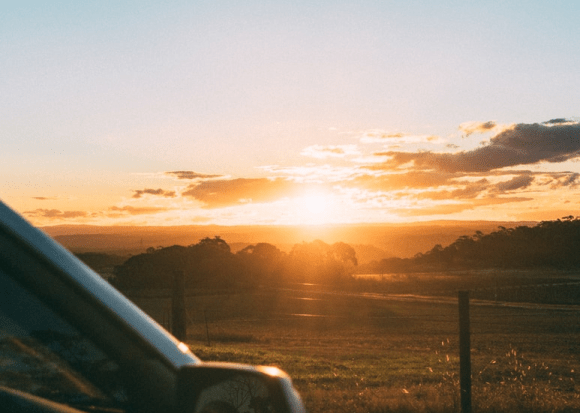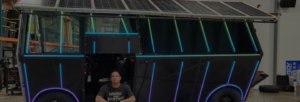Off-Grid Power – Air Conditioners Solar power and lithium battery technology have revolutionized the way...
Read MoreVAN CAMPING 101: BEST VANS, SOLAR, CAMPSITES & MORE
Van camping has become a popular option with outdoor enthusiasts, families on vacation, empty nesters, and singles on the go. Simplicity, self-reliance, freedom, and adventure are benefits enjoyed with van camping. Camper vans, also known as Class B RVs, are easier to maneuver and set up than a full-size RV, offer accessibility to more remote locations, and allow customization to suit your lifestyle. Class B camper vans have morphed into a popular means of traveling and living on or off grid. Self-contained vans allow living comfortably without external hook-ups to water, electric or plumbing systems. Vans made specifically for camping often have full bathrooms and well-designed living quarters. It’s highly recommended to rent a camper van prior to purchasing to make sure this lifestyle is right for you. When you are ready to hit the road, here is everything you need to know about van camping!

Best Vans for Camping
Westfalia
A classic camping van, and the one most people associate with van camping is the Volkswagen van known as a Vanagon, a Westfalia or Westly, or a Eurovan. These vans are no longer manufactured, but are sometimes available as used vehicles. However, do not despair! Airstream, Winnebago, Coachmen, Sprinters, and custom conversion vans have stepped in to pick up the slack.
Airstream
Class B camper vans, by Airstream are the creme de la creme! From the smallest 19’ Interstate model to the luxurious Atlas, the living is sumptuous. Airstream Atlas offers a power slide-out bedroom, a residential style bathroom, an entertainment center, and an efficient galley kitchen all built on a reliable turbo diesel Mercedes Benz chassis. Even the smallest Airstream Class B offers a full bathroom, an efficient kitchen, and side and rear screen doors which allow you to take advantage of the views and fresh air wherever you may be parked. And the smallest van fits into a regular parking space!
Winnebago
This company offers a variety of Class B vans: Solis, Travato, Revel, Era, and Boldt. The least expensive, a gas-fueled Solis, offers a cassette toilet, and the most expensive, the diesel-powered, 4-season Boldt, a wet bath. All Winnebago vans offer a variety of floor plans and options including a pop-up roof, flexible sleeping accommodations, and a plethora of storage options. If you are planning off-road adventures, then the 4WD Revel is your best choice. Any of the Class B Winnebago vans are easy to drive and park.
Coachmen
Coachmen offers three chassis choices: Ford, Ram Promaster, and Mercedes Benz: the Beyond, Nova, or Galleria. These camper vans combine frameless windows that offer amazing views, great fuel economy, economical maintenance, full wet baths, screen doors, heat, air conditioning, generator, and dual-charging solar panels. With a variety of floorplans designed with above floor level plumbing,reflective window coverings, an awning, a full entertainment system, and a choice of sleeping accommodations, you are sure to find a van that meets your needs.
Sprinters
These rigs are extremely popular among van enthusiasts. Whether built on a Mercedes or Dodge gas or diesel engine, the Sprinter camper van offers comfortable drivability, versatile interior amenities, and fuel economy (averaging 18-22 MPG). Builders take a basic cargo van and create features that make living on the road enjoyable. Amenities in Sprinter vans include rear living areas with a table or sofa that converts into a bed; a wet bath in which the shower and toilet share the same space; a kitchen area with stove-top, microwave, refrigerator, sink and counters; and water, heat/AC, plumbing and electrical systems.
Outside Van, Pleasure Way, and Roadtrek
These brands are well-known manufacturers of Sprinter-style campervans. For boondockers, Outside Van offers solar options and hot water, air and heating that run off the diesel engine. There are also extras such as a roof-top tent and a “flarespace” window extension for additional sleeping or gear space. The Pleasure Way Sprinter van includes an awning which extends your living space considerably, along with a sofa that converts to a 70”x76” bed, and a double-door refrigerator. Roadtrek provides a rear slide-out giving the van an extra three feet of space for a permanently set-up bed and lots more storage.
No discussion of camper vans would be complete without mentioning custom conversion vans–the ultimate DIY creative endeavor. In order to be considered a Class B motorhome there must be a kitchen, a bathroom and some form of bedroom. A design that meets your specific wants and needs is limited only by your creative imagination. If you can dream it, you can create a van that embodies that dream by customizing it yourself.

How to Find Campervan Campsites
Campsites for your camper van are available in most RV parks that offer full hook-ups. If having unlimited water and electricity is important, then a full service site may be your choice. However, since many camper vans are often designed with self-contained features that allow living in remote, dry, or boondocking campsites without hook-ups, finding a free campsite on Bureau of Land Management (BLM), National Forest, National Park, and State Park land is a definite plus to owning a camper van.
One essential question to ask about any camp spot you are considering: is it legal to park there? Whether in the wild on BLM land, or on a city street, parking your van in a legal spot is imperative. Also, consider leaving no trace of having camped overnight while leaving the space better than you found it. Other considerations: Is it a level site? Is it quiet, and private? Is there a cell signal? A public restroom (if your van doesn’t have a toilet)? And most importantly, is it safe?
While finding a campsite can be done on the BLM or specific Park websites, an easier option might be using one of the crowd-sourced platforms such as FreeCampsites, iOverlander, Campendium, or The Dyrt. Each of these platforms has locations, reviews, and details on the various free locations for camping. Some also provide locations for potable water, dump stations, nearby food, gas and local attractions. Also consider truck stops, rest areas, casinos, hotels, and local retailers such as Cracker Barrel, Bass Pro Shops, and Walmart/Costco/Sam’s Club for one night stays while traveling between destinations. Want a unique camping experience? Check out Harvest Hosts to spend a night or two in a vineyard or Boondockers Welcome to be a home owner’s guest.

Van Solar System
There are three sources of power for a camper van: plugging into shore power, running a generator, or powering from the sun with a solar system. While plugging into shore power is the easiest, it can be costly to pay for hook-ups. Running a generator is noisy and not environmentally friendly. Using a solar system requires some planning, but is an efficient, earth-friendly means of power for your camper van.
The first question to answer when exploring a solar system for your van is do you want to be off grid for a long time or only on occasion? The second question is, what do you want to power? A refrigerator, a fan, lights, water pump or heater, a laptop or a microwave? Your answers will determine what type of solar system you require.
A solar system gathers energy from the sun, captures it in a storage container (usually a battery), and converts it to electricity to power your appliances using an inverter to convert the DC power in the battery to AC power for your campervan’s electrical needs.
The slimmest, most efficient solar panels are monocrystalline photovoltaic cells which gather the sun’s free energy for you. Since roof space on your van is limited, choosing the best quality, longest lasting panels is important. GoPower! offers the resources to calculate how many panels you will need to run your appliances. The online calculator will provide you with Go Power! recommendations based on your exact needs.
In addition to solar panels, you will need an inverter to convert the stored DC energy to usable AC electric current. GoPower! offers pure sine wave inverters which will provide a steady source of energy.
Knowing how much power your appliances will draw is necessary to determine the size of the battery bank needed to safely operate your appliances without depleting your batteries. Once again, GoPower!’s resource center provides reliable and accurate calculations for deciding whether to purchase an AGM (Absorbed Glass Mat) sealed lead-acid battery or more efficient, though more costly initially, lithium battery bank.
Your budget and the climate conditions will be the determining factors in choosing the type of solar system for your camper van. Let the experts at GoPower! help you choose the best solar system for your needs.

Van Camping Checklist
Van camping gives you an opportunity to explore locations that are not easily accessible. Your van can allow you to take an overnight backpacking adventure or provide a basecamp for hiking, skiing, or even urban explorations. Having the necessities to live in your van simply and comfortably takes planning. Here are some “must have” items for enjoyable van camping.
- Roadside emergency kit
- Spare key magnet
- Reflective windshield sunscreen
- Sunglasses
- GPS tracker
- Cell phone with car and house charging cords
- Head lamp, lantern, and flashlight with extra batteries
- Extra batteries in all sizes
- Camera, lenses, memory card, charger
- Fans: USB, personal, rechargeable
- Kitchen necessities: can opener; cutting board; cooking containers appropriate for the type of stove (microwave, induction, propane); knives; silverware; plates, cups, and bowls; scissors; silicone tongs, spatula, spoon; coffee maker; cleaning supplies; trash can with bags; long, flexible electronic lighter; wine opener; storage containers;
- Clothing for the climate and conditions including rain gear
- Personal toiletry items including toilet paper
- Bedding
- Games, books, sports equipment
- Hammock, camp chair
- Entryway rug/mat
- Backpack, tent, sleeping bag and pad, stove
- Solar system, inverter, battery bank
Now that you’ve found the best camper van for you, loaded it with your gear, decided on a destination, get out on the road. Van camping will bring you to places you only dreamed about visiting and provide memories for years to come. Enjoy!
LATEST NEWS
Watch product troubleshooting videos, read the latest in company updates, and stay up-to-date on trade-shows and events.
Creating the Ultimate Solar-Powered Car
Few people have a more diversified portfolio when it comes to custom car builds than...
Read MoreGo Power! Wins Gold in
Go Power! Wins Gold for Favorite RV Solar Product in the 2024 Wildsam Reader’s Choice...
Read More
STAY UP TO DATE
Get news, product specials, and event invites directly to your inbox.







